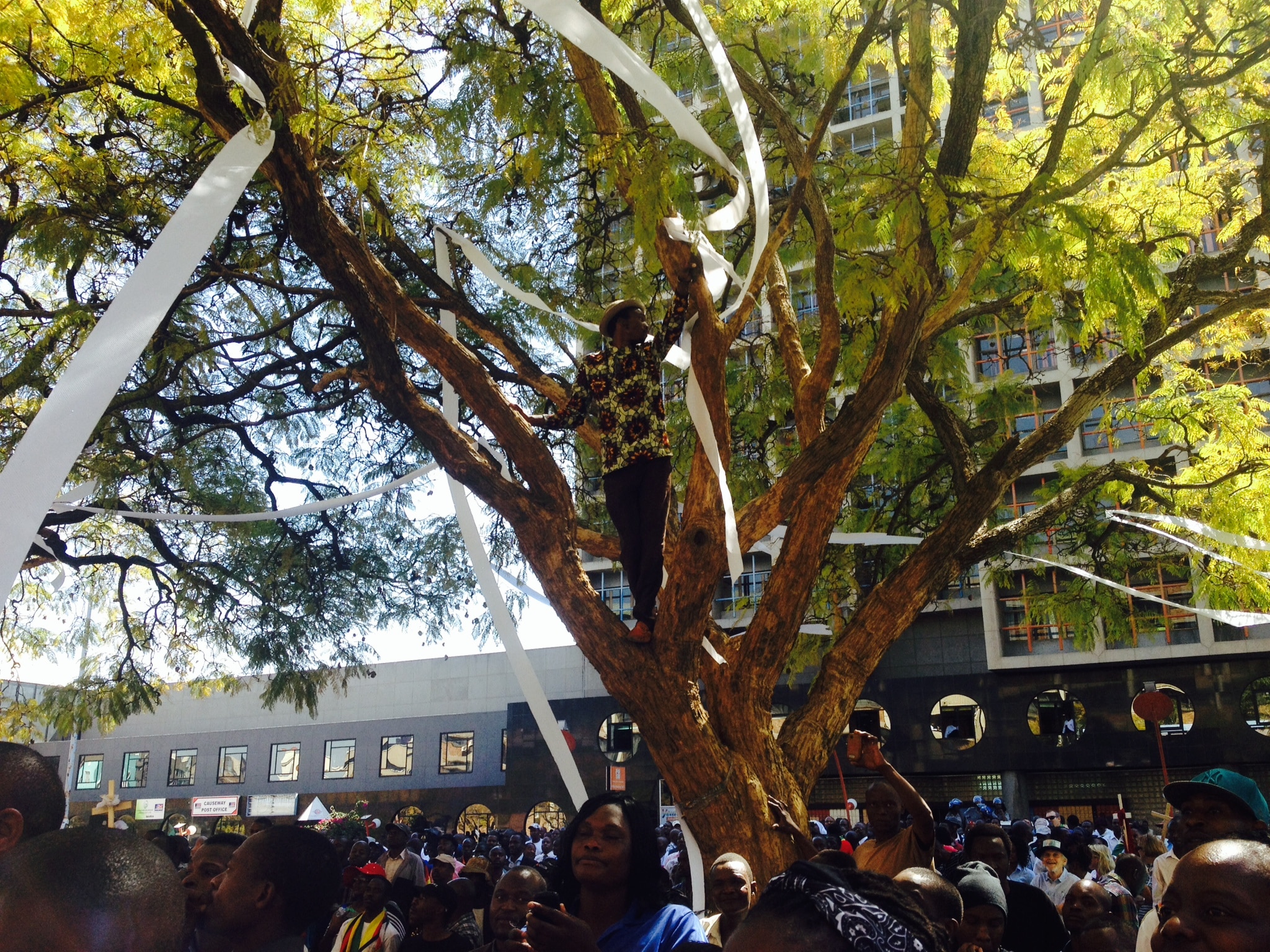Crisis and the meaning of money in Zimbabwe
All sorts of countercultural, even radical signifiers have been ransacked of their meaning in Zimbabwe.

August 3rd protest at Chinamasas. Image via author.
Robert Mugabe Junior has the word “melanin” in his Instagram biography. I discovered this when I went to his profile, a little indulgence I allow myself every few weeks to see just how well the eldest son of our 92-year-old leader is living in Dubai. This time, his profile was locked. Maybe someone had told him that it is gauche to floss on social media when your father’s 36-year rule has impoverished an entire country. But “melanin,” appearing in bold capital letters, still struck me. It’s pretty funny, this gesture of owning one’s blackness — popularized by American teens — being performed by the scion of a family that has caused so much actual harm to black lives.
But of course, all sorts of countercultural, even radical signifiers have been ransacked of their meaning in Zimbabwe. In the past 36 years, the language of decolonization and black empowerment has been stripped of its potency, serving to enrich the new black elite rather than benefit the masses. To counteract this, we’ve had to come up with our own vocabulary of struggle: tajamuka, zvakadhakwa, makwikwi.
We do this so well because we are now experts at semiotic rupture. In 2008, Zimbabwe famously went through an economic crisis, experiencing hyperinflation levels at 79.6 billion percent. During this time, the value of money could be extinguished in a matter of minutes. Someone told me the story of a family member withdrawing a sizable chunk of their life savings to buy a car. The next day, the US dollar was introduced as a measure to stop the downward spiral of the Zimbabwe dollar. They still have bags of the now worthless currency in their house.
Once you have gone through something so traumatic, guarding against its reappearance becomes second nature. This vigilance lives in the bones of Zimbabweans. As the signs of crisis reappear, people begin to steel themselves for the inevitable: queues, shortages, endless hustling. In May of this year, the Reserve Bank of Zimbabwe (RBZ) announced that it would be introducing bond notes, a “surrogate currency” that would only circulate domestically. This was in response to the local shortage of the US dollar, a “cash crisis” that already began to cause panic.
In a beautiful macroeconomic fiction, the RBZ declared that this new currency would exist on a 1:1 basis with the US dollar. “Nothing would change,” they insisted. But people are now wise to these rituals — press statements filled with improbable assertions, denial masked as confidence, and endless clarifications. When they think they have worn you down, there are PR campaigns with catchy jingles to sell the impending crisis. The public received this announcement with a grim knowingness. We were going back to 2008 again. Back to scrambling, back to uncertainty, back to indignity.
Two weeks ago, Finance Minister Patrick Chinamasa warned that although the currency wasn’t going to be released for a few more weeks, counterfeit notes were already being printed by “gangs” intent on sabotaging the RBZ’s reputation. This, he claimed was all “in order to confuse the situation.” This confession of ineptitude was roundly met with derision. All currencies rely on a fiction, but Chinamasa had accidentally let slip that ours was going to be backed up by a particularly weak one. After all, how do you counterfeit a counterfeit?
In the months following the initial announcement, people have protested, they have attended Reserve Bank “public consultations,” they have released sharp and hilarious macroeconomic analyses that have gone viral on WhatsApp. But we know that this government will not listen to us. So we brace ourselves for impact. Mobilities and survival tactics that had lain dormant are now being reactivated. People are moving. Their savings, their bank accounts, anything that can be kept out of the reach of the kleptocratic state. Those who do not have the privilege to move — civil servants, elderly pensioners — sleep outside the banks, waiting to withdraw as little as USD $20 each day.
Even as we are constantly reminded that we already exist in the glorious postcolonial future, Zimbabweans are resisting being thrown back in time. People’s memories of the struggle of 2008 are not romantic things, no one is better off for having experienced it. Our own resilience, a long-praised national quality, has been weaponized against us. For a while now, people have been resisting the narrative that long-suffering makes us virtuous. And yet, it is challenging to disrupt longstanding relationships — to the state, between ourselves as citizens, to our own identities as “resilient citizens.” Resisting requires moving in new ways, and we are constantly improvising the steps. In a final push, a coalition of activists is calling everyone to the streets of Harare later today in a massive anti-bond notes protest. Rambai makashinga.



















